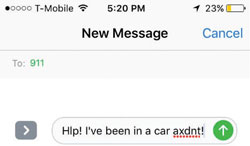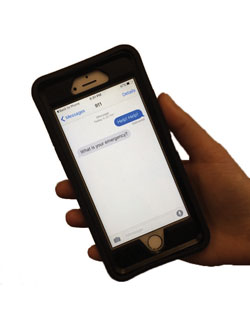Texting 9-1-1 has become an option for the citizens of New Jersey in an effort to allow people who cannot speak during their emergency situation to contact an emergency dispatcher. Effective Sept. 7, the texting capability will also provide people with disabilities, such as those with hearing impairments or deafness, another option for communication.
“The text to 9-1-1 will allow, in the event that the unthinkable happens in our backyard, the public to be able to text 9-1-1 to provide information to first responders arriving on the scene,” said Christopher Rodriguez, Director of New Jersey’s Office of Homeland Security in a press conference on Sept. 7.
The New Jersey Office of Information Technology said that to text 9-1-1, an individual must first open the message app on a phone and dial “911” – without punctuation – in the “to” field. In the message, the texter must then provide as much information about his/her whereabouts in the “body” field, including an exact address (with a unit or apartment number if applicable), surrounding landmarks, a business name, and the names of both streets at the nearest intersection. Additionally, it is highly recommended to send a brief description of the problem, if possible, and then press “send.”
 “We are doing everything we can from a law enforcement and homeland security enterprise to empower our citizens as in this environment they become the first line of defense against people who are doing us harm and in addition we are empowering our first responders to get information that they need when they arrive on the scene,” said Rodriguez.
“We are doing everything we can from a law enforcement and homeland security enterprise to empower our citizens as in this environment they become the first line of defense against people who are doing us harm and in addition we are empowering our first responders to get information that they need when they arrive on the scene,” said Rodriguez.
A 9-1-1 call center should respond to the text, according to the State of New Jersey Office of Information Technology. If the text did not properly work or the text to 9-1-1 option is for some reason not available, the individual should receive a bounce back message. Photos, emojis, and videos cannot be sent or attached in the message. Additionally, the message cannot include another person attached to it. Furthermore, the Federal Communication Commission (FCC) recommends that an individual always make a phone call if you can.
John Comiskey, Assistant Professor of Criminal Justice, said that every college in the nation should have a text messaging option on campus. “It allows people that might not be able to speak during their emergency another way to contact the police,” he said.
There are many positive aspects that could result from implementing the 911 text message option in New Jersey. “They will find out information that find out without it,” said Comiskey. “I mostly see the benefits here. There will be challenges as there are with everything but the benefits outweigh the challenges.”
Comiskey explained how the texting option may allow for police to identify possible patterns in crime. He also said it may attract the use of many millennials since they are accustomed to texting.
Matt Fountain, a senior criminal justice student, believes that texting 9-1-1 can potentially save someone’s live. He said, “I feel like there might be a spike in rates of people abusing this new feature, but more importantly it increases people’s chances of being safe. I think it would be beneficial for Monmouth University Police Department (MUPD) to implement this, it’s better to be safe than sorry. Providing this service will also make parents feel better about their kids going to Monmouth. Just knowing that it is available ensures that their kids are safe.”
“In certain situations texting might be the most efficient way to get help,” said Katryna Cordova, a senior criminal justice student. “However, I believe some people may take advantage of it. If people recognize that it is only to be used in certain situations and not for just anything, then it can definitely have a good effect when helping people.”
PHOTO TAKEN by Jamillah McMillan



